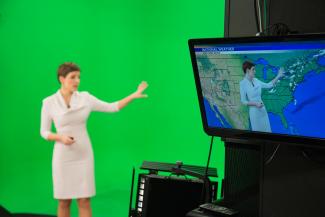
Do the preparation task first. Then listen to the audio and do the exercises.
Preparation
Transcript
Hello and good morning! Well, we're off to a good start in the south this week, as most of the rain from the weekend has disappeared – just a few patches of cloud and maybe some showers here on the east coast. They'll all clear up by lunchtime, though. Over the next day or so, London and the area around Kent can expect a couple of isolated showers, but mostly dry through until Thursday.
It's not such good news for the north-west this week, I'm afraid: more wet weather, and not a lot of sunshine. Some of today's showers will be heavy – and even thundery in Manchester and across the Pennines. Leeds will escape the thunderstorms, with drizzle and light rain only throughout the rest of the day and tonight.
Elsewhere it becomes dry today, but with some foggy patches towards Wales. In England, tomorrow morning will see a dry, bright start in most places, with high temperatures throughout the week. We might see one or two thunderstorms appearing as the week goes on, with temperatures everywhere at 29 to 30 degrees.
By the weekend, unfortunately, the dry weather will make way for mostly cloudy skies and rain. The rain will move from Scotland, down towards the north and reach the south coast by Saturday afternoon. Temperatures, at least, will stay mostly warm at around 21 degrees for the weekend. It might feel like a nice change from the high twenties and early thirties we'll see in the week. That's all from me until tomorrow. Enjoy the mini-heatwave while you can!




Hello Mohammed Jamal,
'to be off' has several common meanings that depend on the situation. Often it is used to show that an action has begun, and in weather forecast on this page, the phrase 'we're off to a good start' means 'the weather has been good'.
A similar use of 'off' in a different context is 'I'm off', which is usually followed by 'to' + a location, e.g. 'I'm off to work' or 'The kids are off to school'. These mean 'I'm leaving for work' or 'I'm going to work' and 'The kids are leaving for school' or 'The kids are going to school'.
There are still other meanings (!), but now at least you're off to a good start at understanding one of the ways this word is used.
All the best,
Kirk
The LearnEnglish Team
Hello Enidcd,
I can see how that is confusing, but if you look at a map of the UK I think it will be clear. 'the north' refers to the north of England, which lies south of Scotland. So the rain begins at the top of the island (in Scotland), then moves down to the north of England and then from there on down to the south (of England).
All the best,
Kirk
The LearnEnglish Team